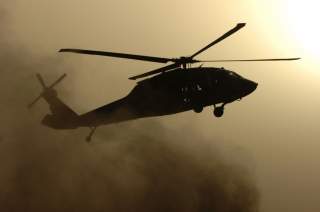Why U.S. Intervention in Tikrit Is a Mistake
America's involvement is not likely to pay off for either Iraq's Abadi or Washington.
The United States has joined the battle for Tikrit by bombing ISIS positions, gambling that the move will strengthen its badly eroded influence in Iraq, rather than undermine it further by handing the Iran-backed Shia militias a victory that will make them even more powerful. By asking for U.S. intervention, Prime Minister Haider al-Abadi is also gambling that U.S. intervention will be decisive in the success of the stalled battle, inflicting a major defeat on ISIS and humiliating the Iran-backed militias that, despite all their swagger, have proven unable to completely liberate the town. For both the United States and Abadi, this is a dangerous gamble. U.S. participation in the battle for Tikrit has already prompted some Shia militias to withdraw from the battle in protest. Unless the Iraqi army can quickly fill the vacuum, U.S. intervention may weaken Abadi and further reduce U.S. influence in Iraq. If the intervention leads to victory, the United States will share the success with the Shia militias and Iran.
The launch of the operation to liberate Tikrit in early March was a humiliation for the United States. U.S. officials were not informed ahead of time, nor were they asked to assist with airstrikes, reducing the United States to the role of spectator in the biggest effort to date to roll back ISIS. Even the Iraqi army, which the United States has been busy retraining, played a secondary role in the operation so far. The real players have been the Shia militias collectively known as the Popular Mobilization forces. These forces are armed by Iran and supported by its advisors in the Revolutionary Guard, with General Qassem Suleimani appearing frequently in pictures alongside the Iraqi fighters participating in the operation. And although Abadi and the Iraqi government have supported the operation, they have not controlled it so far.
Despite the initial swagger of the militias—which promised quick results and contemptuously dismissed suggestions that they needed U.S. air support—by mid-March, the operation was bogged down in IEDs, booby-trapped buildings and urban combat, with a small number of ISIS fighters entrenched in parts of Tikrit. Having taken heavy casualties, the militias halted, postponing a final assault on the town and settling for a longer process of choking the ISIS fighters still on the ground.
For Abadi, the stalling of the operation was both a problem and an opportunity. Obviously a setback in the effort to free Iraq from ISIS control, it was an even bigger setback for the militias that threatened to overshadow and overpower his government. For the United States, the militias’ failure to liberate Tikrit was an opportunity to demonstrate Iraq’s continuing dependence on American support. Iran had not been able to deliver.
Against the militias’ strong objections, Abadi thus requested that the United States provide air support in Tikrit, as it has been doing elsewhere. “Some of the weaklings in the army…say we need the Americans, while we say we do not need the Americans,” Hadi al-Ameri, the head of the Badr Brigade, which is at the forefront of the fighting, recently declared. But Army Staff Lieutenant General Abdulwahab al-Saadi thought otherwise, stating that he requested U.S. strikes, because they were essential to breaking the impasse.
Prime Minister Abadi and the Iraqi army gained the argument, with U.S. strikes against ISIS positions in Tikrit starting on March 26. Abadi announced on television that the final phase of the liberation of Tikrit had started, promising quick results. Two militias, although not the Badr Brigade, immediately withdrew from the battle in protest over the American intervention.
The United States stipulated as a condition for intervention that the operation be placed under the unified command of the Iraqi military, decreasing the autonomy of the militias. This is a tall order. The militias so far have a much larger number of men in the battle and have done much of the fighting. They are unlikely to submit easily to orders from the “weaklings” that called in the Americans. It is also doubtful that the Iraqi military that is now supposed to lead the effort can do so successfully; even U.S. trainers judged it would not be ready to conduct major operations for months to come. The withdrawal of the militias could prove disastrous, strengthening ISIS, further demoralizing the Iraqi Army and confirming Abadi’s dependence on the militias and Iran.
If the Badr Brigade and other militias remain in the fight, the danger that the offensive would collapse on the ground, despite U.S. air support, would decrease, but the United States would find itself in a de facto alliance with Iran. This would further anger the Arab countries of the Gulf, which already suspect the United States of being willing to turn the security of the region over to Iran. The fact that Sunni participation in the battle for Tikrit has been minimal does not help.
The most positive outcome would be one in which the militias withdraw in protest, but a surge in the presence of Iraqi troops (special forces are reported to be on their way to Tikrit) carries the day, with Tikrit being liberated not by Iran-backed militias, but by the U.S.-backed Iraqi military. Judging on the United States’ own estimates of the conditions of the Iraqi army, it is not a likely scenario. U.S. intervention in the battle for Tikrit is not likely to pay off for either Abadi or Washington.
Marina Ottaway is a senior scholar at the Woodrow Wilson International Center for Scholars.
Image: Flickr/U.S. Army

